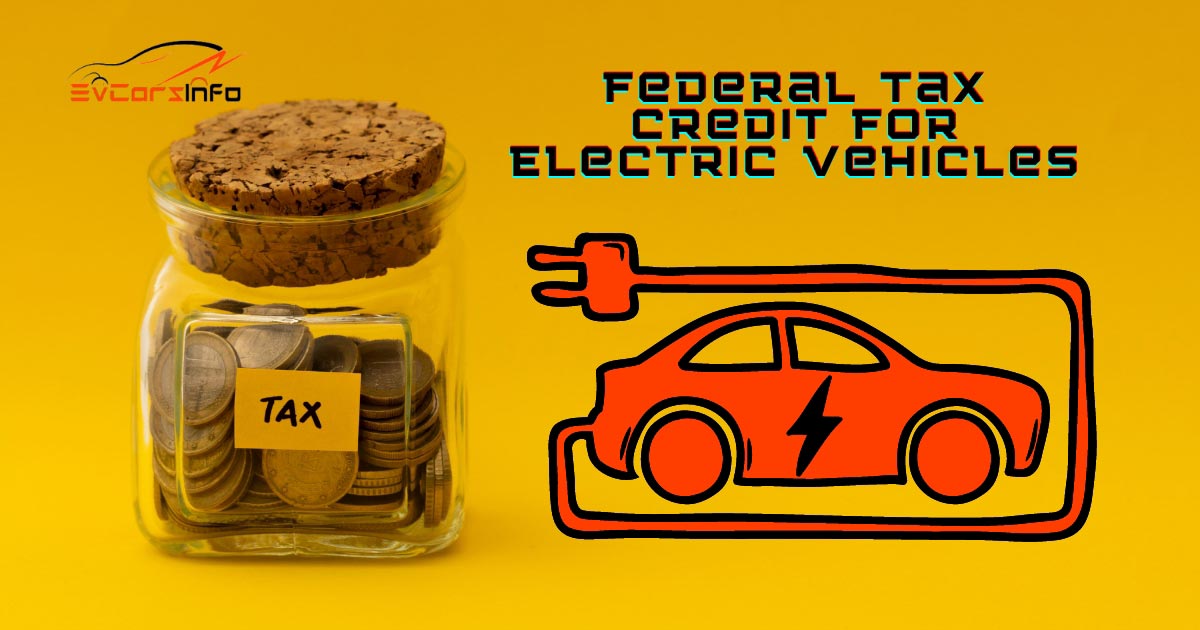

Federal Tax Credit for Electric Vehicles or 2024 EV Tax Credit
Introduction.
Many new and potential buyers of electric vehicles are uncertain about their eligibility for the federal tax credit for electric vehicles or 2024 EV Tax Credit, as sales of these vehicles continue to soar, particularly now that a host of additional benefits have been reintroduced for US consumers. It’s not as easy as saying “yes” or “no” when it comes to qualifying; okay, sort of, but the amount that each household may be eligible for varies depending on a variety of criteria. Additionally, you may not even be aware of additional possible savings that are available to you.
Amount of Federal Tax Credit for Electric Vehicles or 2024 EV Tax Credit
Prior to anything else, it’s critical to comprehend the “may” and “up to” clauses that the government places ahead of the $7,500 credit. In other words, you could be eligible for a federal tax credit about an electric car of up to $7,500. This credit may initially appear to be a straightforward flat rate, however that is regrettably not the case. Its federal tax credit for Electric Vehicles or 2024 EV Tax Credit would be $3,500, for instance, if you bought new Ford F-150 Lightning or owing $3,500 in income taxes this year.
To be eligible for the entire $7,500 credit, your federal income tax obligation must be at least $10,000. However, under the revised tax agreement, you might be able to claim that credit right away at the time your EV is purchased. It’s crucial to understand that any unused amount of the $7,500 cannot be used as a refund or a tax credit for the following year.
Way to qualify an EV for a federal tax credit?
The concept, according to the United States Department of Energy, is pretty straightforward: “All electric and plug-in hybrid vehicles which were bought new during or after 2010 might well be qualified for a federal tax credit for up to $7,500.“”” That being said, you cannot just go out and get an electric car and then anticipate Uncle Sam to reduce your taxes by $7,500 in April.
In actuality, your income tax and the size of the battery system in the car you own determine how much you are eligible for. There are now many more requirements to be aware of as a result of the recently signed Inflation Reduction Act, such as the need that an electric vehicle is produced in North America.
Federal Tax Credit for Electric Vehicles or 2024 EV Tax Credit
For used EVs, the tax credit will be based on the lesser of 30% of the car’s value or $4,000. From January 1, 2023, the following regulations also come into force for previously owned EVs:
The price ceiling for second hand cars
No matter what kind of used EV, there is a strict eligibility cap at a sale of $25,000.
Income restrictions for secondhand cars according to filing status
MAGI cannot be more than $150,000 for combined tax returns or even a surviving spouse. MAGI for the household’s head cannot be more than $112,500. MAGI cannot exceed $75,000 whether the filing status is individual or any other.
Additional prerequisites for used EVs
In order to qualify, the car has to be least two models years older compared to the year of purchase. Only once during the lifespan of the car will the utilized EV tax credit be available. Future owners won’t be qualified. After claiming the federal credit for used EVs, the buyer loses any future credit eligibility for three years. The car has to be “not for selling” and for personal use only. A dealer must be used to acquire the automobile. Utilized EV tax credit may only be applied by an individual. Companies are not included.
Alterations to the Law
Inflation Reduction Act became official after President Biden’s signature. It changes the way the electric car tax credit program in America operates, among other things.
Up until recently, Americans could purchase a variety of electric vehicle models and be eligible for one $7,500 rebate when it came time to submit their federal taxes. Because the rebate was eliminated once a company sold 200,000 electric vehicles, not all EVs qualified. On January 1, 2023, the 200,000-car limit will no longer apply under the new regulations. What was formerly a tax credit after the sale can now be converted to a discount. However, new limitations are now in place. Some are based on income. Discounts are only available to those who have adjusted gross earnings of less than $150,000.
The new thresholds are $225,000 for head of household taxpayers and $300,000 as joint filers. Caps on prices are another. Only vehicles priced below $55,000 and under $80,000 for trucks and SUVs are now eligible for the rebate.
The alteration that will have the most effect, though, is where the automobiles are made. The new tax advantages are only applicable to automobiles built in North America. Electric car manufacturers produce several models that are offered in America and on other continents. According to the Alliance of Automotive Innovation, a trade organization for the sector, 72 EVs qualified for the previous tax credit. Aproximately 50 have been disqualified due to the locations of their assembly plants.
FAQ:
How soon will I receive my Federal Tax Credit?
Terms might vary, but tax credits are generally applied to tax returns for the year the EV charger is purchased. Before making a purchase, kindly inquire about information with the program’s administrator or stop by their main office.
What is the Federal Tax Credit for EV chargers?
They may occasionally be modest, around $50. When compared to the price of an electric car charger type like a JuiceBox, they can be fairly expensive in other instances, lowering the cost of the charging station to a mere fraction of its initial cost.
See More:
How Longer does the EV Battery Last
Rebate For Electric Car in California
10 Best EV Car Under 30k | Top Ten Used Electric Cars Under $30,000
Facebook
Twitter
LinkedIn
Pinterest
Tumblr
Categories
- Abarth (1)
- Acura (1)
- Apple (1)
- Audi (5)
- BMW (3)
- Buick (1)
- Buying Guide (15)
- BYD (2)
- Cadillac (2)
- Car News (41)
- Car Reviews (1)
- Chevrolet (2)
- Citroen (2)
- CUPRA (1)
- EV Basic Info (14)
- Explore EVs (121)
- Fiat (1)
- Fisker (4)
- Ford (3)
- Genesis (3)
- GMC (3)
- Honda (4)
- Huawei (1)
- Hyundai (6)
- Jeep (2)
- Kia (7)
- Lexus (1)
- Lotus (3)
- Lucid Air (2)
- Maintenance Tips (2)
- Maserati (1)
- Mercedes (4)
- Mini (1)
- NIO (4)
- Nissan (2)
- OPEL (1)
- Peugeot (2)
- Polestar (6)
- Porsche (3)
- Ram (1)
- Renault (1)
- Rivian (6)
- Rolls-Royce (1)
- Scout (1)
- Sono (1)
- Subaru (1)
- Tata (1)
- Tesla (6)
- Toyota (3)
- VinFast (5)
- Volkswagen (4)
- Volvo (5)
- Xiaomi (1)
Recent Posts
Related Info
Popular Tags
24 Hour Series
2024 Acura ZDX EV
2024 Chevrolet Silverado EV
2024 Ford F-150 Lightning
2024 Genesis Electrified GV70
2024 GMC Hummer EV Pickup
2024 GMC Hummer EV SUV
2024 Honda Prologue EV
2024 Hyundai Ioniq 6
2024 Kia EV9
2024 Kia Niro EV
2024 Lexus RZ
2024 Nissan Ariya Nismo electric SUV
2024 Polestar 2
2024 Rivian R1S
2024 Rivian R1T
2024 Subaru Solterra EV SUV
2024 Toyota bZ4X
2024 Toyota Mirai
2024 Toyota RAV4 Prime
2024 Volkswagen ID 4
2025 Jeep Wagoneer S
2025 Porsche Taycan
2025 Volvo EX90
Audi Wins 2024 Dakar Rally
BYD Qin L Exposed
Citroen e-C3 2025
Electric Vehicles in Recession
Federal Government Orders recall
GMC Sierra EV Denali Edition 1
Huawei Alpha T5
Hyundai Ioniq 5 2024
kia
Kia Niro
mi su7 price
Music Platform Melon
Porsche Macan EV
Renault 5 E-Tech EV In 2024
Scout Motors EV
Sell Used Electric
Tesla
Tesla Model Y 2024
Tesla Recalls 1.62 M Vehicles
Toyota
Xiaomi SU7
Related posts

March 15, 2024
Xiaomi, a Chinese company nicknamed the “Mistakes on the Continent” for its affordable and high-quality home appliances, will...

Hyundai Motors To Sell Used Electric Vehicles Starting Next Month
OmarBinSofi
February 5, 2024
Hyundai Motor Company is expanding its business by adding electric vehicles to the ‘certified used cars’ it will...

Electric Vehicles in Recession, Warning Light On Discount Competition
OmarBinSofi
January 28, 2024
Electric vehicles in recession, Alert indicator signaling the presence of a discounted competition. The global electric vehicle market...

Audi Wins 2024 Dakar Rally With RS Q E-Tron
OmarBinSofi
January 24, 2024
Audi wins 2024 Dakar Rally with the Audi‘RS Q e-tron’ equipped with an electric power system. Audi won...
EvCarsInfo provides all latest, popular, upcoming, Electric Vehicles News, Reviews and information.We are mainly focused on the Buying Guide, Car News, Car Reviews, Upcoming Cars, ETC.






